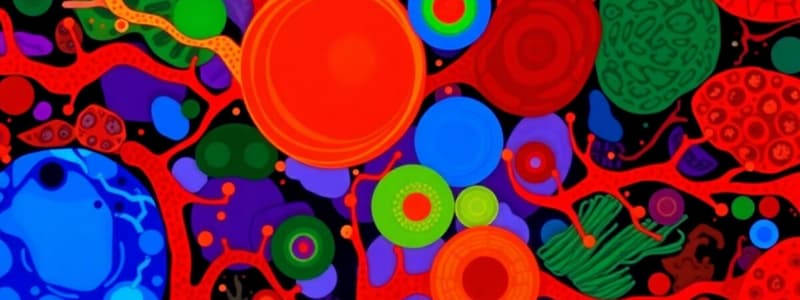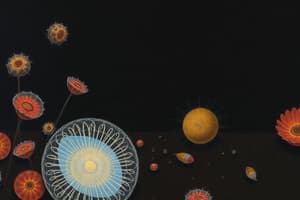Podcast
Questions and Answers
What component is absent in bacterial cells that is typically found in plant cells?
What component is absent in bacterial cells that is typically found in plant cells?
- Cell membrane
- Chloroplasts
- Vacuoles (correct)
- Cell wall
What is the primary function of a contractile vacuole in unicellular organisms?
What is the primary function of a contractile vacuole in unicellular organisms?
- Assist in cell division
- Regulate water levels (correct)
- Store nutrients
- Produce energy
Which structure is involved in the photosynthesis process?
Which structure is involved in the photosynthesis process?
- Stroma (correct)
- Mitochondria
- Nucleoid region
- Ribosome
Which statement accurately describes prokaryotic cells?
Which statement accurately describes prokaryotic cells?
What type of organisms contain chloroplasts?
What type of organisms contain chloroplasts?
In what form is energy stored after photosynthesis occurs?
In what form is energy stored after photosynthesis occurs?
What distinguishes eukaryotic cells from prokaryotic cells?
What distinguishes eukaryotic cells from prokaryotic cells?
What structure in chloroplasts is modified into sacs called thylakoids?
What structure in chloroplasts is modified into sacs called thylakoids?
What is the primary function of parenchyma tissue?
What is the primary function of parenchyma tissue?
Which type of parenchyma is responsible for photosynthesis?
Which type of parenchyma is responsible for photosynthesis?
What distinguishes angular collenchyma from other types?
What distinguishes angular collenchyma from other types?
What accumulates in the large central vacuole of older parenchyma?
What accumulates in the large central vacuole of older parenchyma?
Which type of collenchyma has more thickening at places adjacent to intercellular spaces?
Which type of collenchyma has more thickening at places adjacent to intercellular spaces?
What substance do xylem parenchyma primarily store?
What substance do xylem parenchyma primarily store?
What characteristic is not associated with parenchyma tissue?
What characteristic is not associated with parenchyma tissue?
Which type of collenchyma is also referred to as plate collenchyma?
Which type of collenchyma is also referred to as plate collenchyma?
What is a primary assertion of the Cell Theory?
What is a primary assertion of the Cell Theory?
Which characteristic is essential for an organism to maintain homeostasis?
Which characteristic is essential for an organism to maintain homeostasis?
What does the concept of 'Omnis cellula e cellula' imply?
What does the concept of 'Omnis cellula e cellula' imply?
Which of the following is true about cellular energy requirements?
Which of the following is true about cellular energy requirements?
What is the significance of organelles such as chloroplasts and mitochondria according to the Endosymbiotic Theory?
What is the significance of organelles such as chloroplasts and mitochondria according to the Endosymbiotic Theory?
How do cells contribute to genetic continuity in daughters during division?
How do cells contribute to genetic continuity in daughters during division?
What aspect characterizes prokaryotic cells in contrast to eukaryotic cells?
What aspect characterizes prokaryotic cells in contrast to eukaryotic cells?
What is a notable feature of all living cells concerning their chemical composition?
What is a notable feature of all living cells concerning their chemical composition?
What is the primary function of xylem in plants?
What is the primary function of xylem in plants?
Which of the following is a characteristic of mature xylem cells?
Which of the following is a characteristic of mature xylem cells?
Which cell type within the phloem performs the role of structural support?
Which cell type within the phloem performs the role of structural support?
What type of cells are responsible for the conduction of prepared food in the xylem?
What type of cells are responsible for the conduction of prepared food in the xylem?
Which of the following tissues requires the most energy for transport?
Which of the following tissues requires the most energy for transport?
What type of cells are tracheids found in?
What type of cells are tracheids found in?
Which of the following best describes the vascular tissue in plants?
Which of the following best describes the vascular tissue in plants?
Which option accurately defines the function of connective tissue in animals?
Which option accurately defines the function of connective tissue in animals?
What is the role of the G1 phase in the cell cycle?
What is the role of the G1 phase in the cell cycle?
Which statement accurately describes cytokinesis?
Which statement accurately describes cytokinesis?
What occurs during the S phase of the cell cycle?
What occurs during the S phase of the cell cycle?
Which phase is not a part of the cell cycle?
Which phase is not a part of the cell cycle?
What is the primary purpose of the G2 phase in the cell cycle?
What is the primary purpose of the G2 phase in the cell cycle?
Which of the following best describes the mitotic phase?
Which of the following best describes the mitotic phase?
In what way does the cytokinesis process differ in animal cells compared to plant cells?
In what way does the cytokinesis process differ in animal cells compared to plant cells?
During which phase of mitosis do chromosomes align at the cell's equatorial plane?
During which phase of mitosis do chromosomes align at the cell's equatorial plane?
Flashcards are hidden until you start studying
Study Notes
Main Characteristics of an Organism
- Composed of cells, the fundamental unit of life.
- Requires energy for growth, metabolism, and other functions.
- Capable of reproduction, ensuring species survival.
- Maintains homeostasis, balancing internal conditions.
- Organized structure, facilitates specialized functions.
- Engages in growth and development throughout its lifecycle.
- Utilizes fluid-filled sacs for storage, especially in plant cells.
Cell Theory
- States that all cells arise from pre-existing cells, summarized by "Omnis cellula e cellula."
- Cells carry genetic material, transmitted to daughter cells during cell division.
- Uniformity in chemical composition across different cell types.
- Energy flow and biochemical processes are integral to cell function.
Differences Between Prokaryotic and Eukaryotic Cells
-
Prokaryotic Cells:
- First type of cells, lack a nucleus and membrane-bound organelles.
- Simplest cellular form, includes bacteria.
- Contain a single circular chromosome in the nucleoid region.
- Surrounded by a cell membrane and cell wall made of peptidoglycan.
- Carry ribosomes for protein synthesis within the cytoplasm.
-
Eukaryotic Cells:
- Contain a nucleus and membrane-bound organelles.
- Examples include protists, fungi, plants, and animals.
Cell Structure and Functions
- Cell Membrane: Regulates entry and exit of substances.
- Cytoplasm: Jelly-like fluid where organelles are suspended.
- Nucleus: Houses genetic material and controls cellular activities.
Types of Plant Cells
-
Parenchyma:
- Composed of thin-walled, living cells with metabolic functions like photosynthesis and storage.
- Types include chlorenchyma (photosynthetic) and xylem parenchyma (storage).
-
Xylem:
- Transports water and minerals from roots to leaves, providing structural support.
- Composed of dead cells, facilitating passive water movement.
-
Collenchyma:
- Provides flexible structural support, with varied cell wall thickening.
Animal Tissue Types
- Epithelial Tissue: Covers body surfaces and cavities, involved in secretion.
- Connective Tissue: Supports and protects organs and structures.
- Muscle Tissue: Facilitates movement.
- Nervous Tissue: Transmits electrical signals for communication.
Endosymbiotic Theory
- Proposed by Lynn Margulis, suggesting some organelles originated from free-living cells.
- Chloroplasts and mitochondria contain their own DNA, suggesting a symbiotic relationship.
Cell Cycle
-
Consists of several stages:
- G1 Phase: Initial growth and preparation for DNA replication.
- S Phase: Synthesis phase where DNA is replicated.
- G2 Phase: Final growth phase before cell division.
- G0 Phase: Resting stage for cells that no longer divide.
-
Mitotic Phase:
- Includes mitosis (the division of the cell's nucleus) and cytokinesis (the division of the cytoplasm).
- Results in two genetically identical daughter cells.
Studying That Suits You
Use AI to generate personalized quizzes and flashcards to suit your learning preferences.



